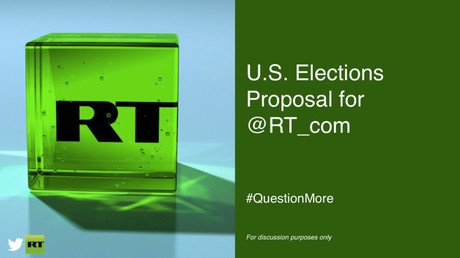Non-yellow-vest protests are good? Macron hails Venezuela coup attempt as ‘restoration of democracy’
Emmanuel Macron has praised the “courage” of Venezuelan protesters but fell short of recognizing self-declared “acting president” Juan Guaido. His desire to exert influence on Latin America could back him into a corner in Paris.
“After the illegal election of Nicolas Maduro in 2018, Europe supports the restoration of democracy. I salute the courage of the hundreds of thousands of Venezuelans marching for their freedom,” Emmanuel Macron tweeted in French on his official account.
Après l’élection illégitime de Nicolás Maduro en mai 2018, l’Europe soutient la restauration de la démocratie. Je salue le courage des centaines de milliers de Vénézuéliens qui marchent pour leur liberté.
— Emmanuel Macron (@EmmanuelMacron) January 24, 2019
The French leader went beyond the official statement from the EU, which has called for “an immediate political process leading to free and credible elections, in conformity with the constitutional order" although President Maduro’s second term officially runs to 2024.
The messages came as months of anti-government protests flared into violence over the past week, with National Assembly leader Guaido publicly proclaiming himself the new interim leader of the country during a rally in central Caracas on Wednesday.
Macron might be backing himself into a corner with his desire to exert influence on the situation in Venezuela and elevate his status on the international arena against a backdrop of a quite precarious situation at home, Chris Reynolds, an Associate Professor in Contemporary French and European Studies at the Nottingham Trent University, believes.
“We can see a direct contradiction here between the domestic situation and Macron’s [statement] on this emerging situation in Venezuela,” Reynolds told RT, adding that the president’s response to the domestic Yellow Vests protests was “quite strong.”
Après l’élection illégitime d’Emmanuel #Macron en mai 2017, le Peuple français soutient la restauration de la démocratie. Je salue le courage des centaines de milliers de Français qui marchent pour leur liberté. #GiletsJaunespic.twitter.com/FKHWWaDXix
— Patrice Gravoin nº 35072 (@PGravoin) January 24, 2019
France has been gripped by massive weekly protests since November. United under the umbrella movement known as the Yellow Vests, the demonstrators, who first turned to the streets to protest fuel price hikes, are now expressing their discontent over Macron’s broader reform agenda.
On en parle de ton élection et du courage de centaines de milliers de Gilets Jaunes qui marchent pour la liberté et la démocratie ? https://t.co/c1w6hwBuu8
— Raphaël 🌻💚 (@RaphGreen) January 24, 2019
Protests have often been marred by violence and were met with heavy police response as well as condemned by the president.
With his sudden support for the Venezuelan street protests, Macron “opens himself up to criticism,” the professor said. “Those people, who would seek to criticize Macron will see a contradiction between his ambiguous support for the Venezuelan street protests [and his reaction to domestic protests] and therefore will have material to criticize him.”
The fact that Macron stopped short of backing Guiado directly, and opted for a more vague statement instead, shows that he is well aware of this contradiction. “Macron finds himself in a situation, in which he cannot overtly express support to the Venezuelan opposition political leader, who has been brought to the fore on the back of the street protests,” Reynolds said.
Yet, he might still be forced to openly support Guiado by Washington, which apparently sees the Venezuelan opposition leader as a key to achieving its own goals in the Latin American country, Reynolds stressed. The latest developments in Venezuela “do appear” to be a “coordinated effort on behalf of [US President Donald] Trump and the opposition leader… and it is not something that just came out of nowhere,” Reynolds added. He also said that support for the opposition leader will be building and “that the EU could come under pressure from the US.”
The situation in Venezuela remains tense. Apart from isolated uprisings, the army has remained loyal to the elected government, despite being offered amnesty for rebelling by the opposition leaders. Guaido’s decision to up the stakes has exposed deep international rifts over the economically-stricken Latin American country.
The US, the main proponent of regime change in the country over more than a decade, has led calls for Guaido to be given diplomatic recognition. This has sparked anger from Caracas, which has officially broken diplomatic ties with Washington, and given the US diplomats in the country 72 hours to leave.
Also on rt.com US interfering in Venezuela? No need to ask Mueller to determine that – LavrovOther countries to back the overthrow include Canada, and most of Latin and South America.
Russia, which had long accused the West of stoking protests in the South American country, called Guaido’s declaration an attempted coup, and said that a “catastrophic scenario” was unfolding. China similarly urged for principles of “sovereignty, independence and stability” to be maintained. Other countries to back the incumbent include Mexico, Iran, Uruguay and Turkey.
Like this story? Share it with a friend!













